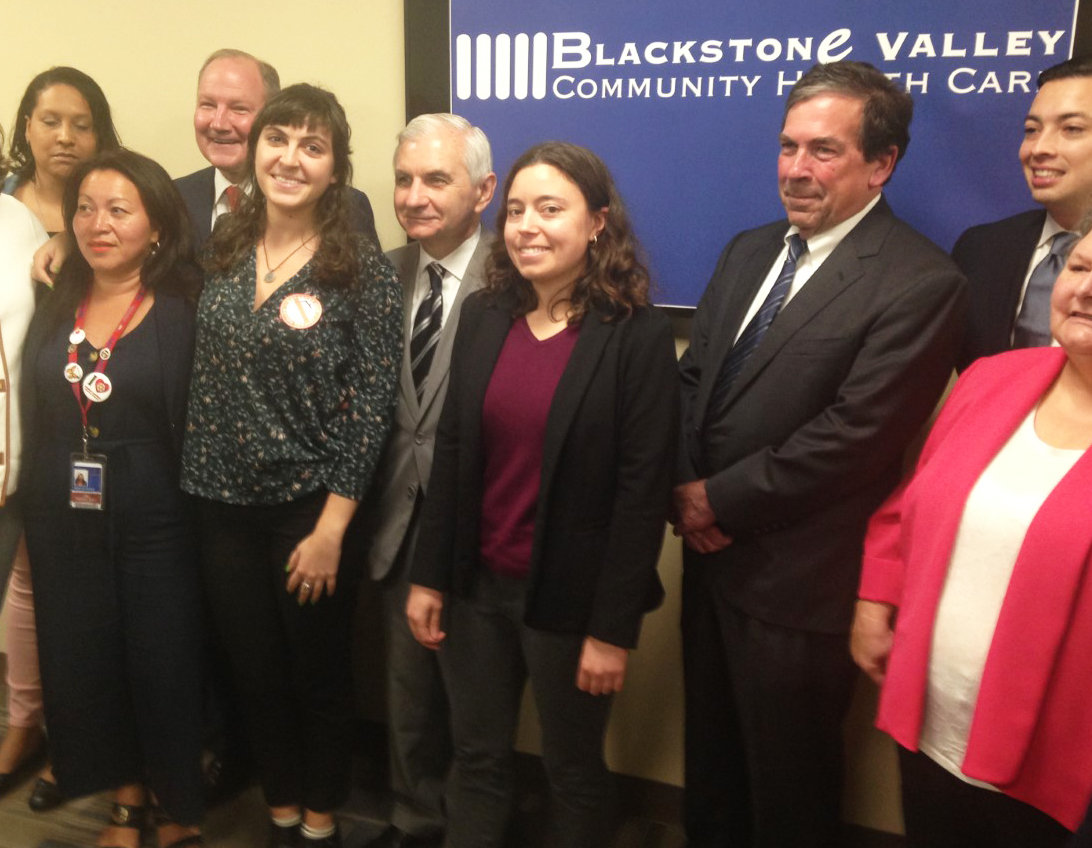Sen. Reed delivers, the mayors step up to the plate
And, the advocates for childhood lead poisoning prevention share in the spotlight
The answers to these questions, broken down as a function of cost to the school system, may yield some surprising results. It may prove more cost effective to invest in lead remediation and childhood lead poisoning in housing than trying to invest in curriculum changes or an increase in teachers. Call it a case of politics of problem definition.
CENTRAL FALLS – The new Neighborhood Health Station in Central Falls, created by Blackstone Valley Community Health Care, has not only become the place to go for most of the city residents seeking urgent and primary care, the new facility has also become the go-to place to hold news conferences focused on health care and community development.
Last month, on Sep. 3, Gina Raimondo hosted a news event, using the Neighborhood Health Station as a backdrop, to tout the efforts to lower health care costs in Rhode Island. [See link below to ConvergenceRI story, “Strategies to improve the health of communities.”]
Last week, on Monday afternoon, Oct. 7, the new facility served as the host of a news event featuring the investment of some $8.4 million in federal funds to remediate lead paint hazards in Central Falls and Pawtucket, resources championed by Sen. Jack Reed in his role as the Ranking Member of the Senate Appropriations Subcommittee on Transportation, Housing and Urban Development. Another $4 million through the program was being invested in Woonsocket, bringing the total of federal funds to address lead paint remediation and childhood lead poisoning to $12.4 million.
The funding is part of $314 million that was awarded nationally to 77 state and local governments, with Rhode Island Housing being one of seven grantees in the country to receive funds to help “high impact neighborhoods” to reduce lead hazards in communities with poor housing conditions.
If pollsters and political prognosticators wanted to understand why Sen. Jack Reed enjoys such tremendous support in Rhode Island, all they needed to do was to have attended the news event last week where everyone – Central Falls Mayor James Diossa, Pawtucket Mayor Daniel Grebien, Rhode Island Housing Executive Director Carol Ventura, and David Tille, the HUD New England Regional Administrator, all sang Reed’s praise and his role as a champion for children.
In his succinct manner of speaking Reed explained the importance of the new funding.
First, Reed praised the advocates who had assembled for the news conference, in particular the organizers with the Childhood Lead Action Project. “I want to thank all of the advocates that are here today,” he said. “You are really the difference. If it were just public officials trying to get something done, it wouldn’t get done. You have the people who are active and positive and relentless.”
Lead poisoning of children, Reed said, “is a preventable tragedy, absolutely preventable.” It should not be a matter of debate, he continued. “Every child deserves a healthy home, a healthy start in life. These federal funds will help us do that, and it will protect the most at-risk children in our state.”
What the mayors said
Central Falls Mayor James Diossa began by thanking Sen. Reed and by jokingly referring to his fellow mayor, Donald Grebien of Pawtucket, as a “brother from a sister city,” drawing laughs from the more than 50 participants.
Diossa spoke about how in the past year, working in partnership with the Childhood Lead Action Project, the city of Central Falls was “stepping up our enforcement actions against landlords who are not following the city’s lead poisoning prevention laws.”
With the new grant, Central Falls will now have the resources to invest in further enforcement actions, according to Diossa, because the problem of childhood lead poisoning in his city was significant.
“While Rhode Island has experienced a decline in childhood lead poisoning rates over the last 15 years, rates in Central Falls have remained relatively high, in large part because of the age of our housing stock,” Diossa said.
As a result, Diossa continued, “For children who are just entering kindergarten this year in Central Falls, 11 percent of those children tested positive for dangerous levels of lead in their blood – nearly double the level of the entire state.”
Translated, according to Diossa, “That is approximately two students in each of our kindergarten classes. This is a public health crisis for our children.”
In turn, Pawtucket Mayor Donald Grebien shared the results of improved efforts by his city inspectors, working with childhood lead prevention advocates, to work to prevent this preventable disease. Between 2014 and 2019, Grebien said, 423 housing units have gotten their properties lead certified.






